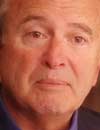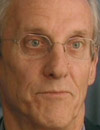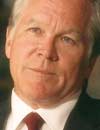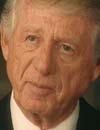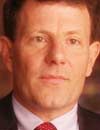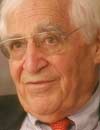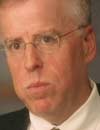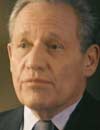- Ken Auletta
Writer, The New Yorker - Tom Bettag
Former executive producer, Nightline, CBS Evening News - Bill Keller
Editor, The New York Times - Ted Koppel
Former anchor, Nightline - Nicholas Kristof
Columnist, The New York Times - Judith Miller
Freelance reporter - Walter Pincus
Reporter, The Washington Post - Tom Rosenstiel
Director, Project for Excellence in Journalism - Bob Woodward
Reporter, The Washington Post
People were frightened, and people probably gave Bush in the press more benefit of the doubt than they should have. So when he announced that somehow Saddam Hussein was connected to our enemies, including Osama bin Laden, and then had Colin Powell, the secretary of state, come up to the U.N. and show these horrifying pictures of places where the weapons of mass destruction were stored and manufactured in Iraq, there was a natural tendency to believe it. They were aided by the fact that if you go around the world to other intelligence services -- the French, the Germans, the British, the U.N. weapons inspectors -- there was a general consensus that, in fact, Saddam Hussein did have weapons of mass destruction. ...
So the press was hamstrung in part by the fact that it seemed there was a consensus that he did have these weapons of mass destruction. Very few people thought he didn't have them. Now, people thought he might not use them, ... but it was a hard story to get, because you couldn't find good sources, intelligent sources, who said the opposite of what the Bush administration was saying. Nevertheless, the press went through a period of time where their coverage was too soft on Bush and not enough skepticism. ...
There's been a lot of criticism of us in the press for ... not reporting more critically about, for instance, whether there were weapons of mass destruction or not. Looking back at that period, did we do a good enough job?
No, we did not do a good enough job. At the same time, I'm somewhat forgiving on that front. I think 9/11 was one of those major events that set a notion of "We are a nation at war." ... This is [a] kind of post-Pearl Harbor atmosphere in which it is extremely difficult to be questioning the people who brought you through 9/11.
I think one of George Bush's better moments was in that post-9/11 period. He really did get the country through that, so there was an enormous amount of credibility on that side. And that makes it very difficult. The way the U.S. media handled itself during World War II, the way it handled itself in the Korean War or the beginning of the Vietnam War, was very uncritical in the same way, and I think we were caught in that. But as a result, we didn't do a good job.
One of the problems here was that she was obviously the subject of great criticism ... because of the nature of her coverage of the weapons of mass destruction issue. … In the end, was she really responsible for all of that, or was that really a problem of the editors at The New York Times?
I wrote the editor's note where we went back and re-examined all of that coverage, much of it Judy's, although not all of it. ... I think people lost sight of the whole climate at the time that she was writing those stories; you can find people who write about Judy Miller as if she started the war in Iraq all by herself without even any involvement of the Bush administration.
The fact of the matter is, in the run-up to the war in Iraq, everybody believed that Saddam Hussein had weapons of mass destruction. It wasn't an eccentric view or a warmonger's view or a right-wing view. In fact, we now know from Michael Gordon's book [Cobra II: The Inside Story of the Invasion and Occupation of Iraq], his own generals believed that he had WMD, and they only learned it on the eve of the war ... that they didn't have any weapons of mass destruction to fend off the invaders with. ...
Now, in that context, a lot of people wrote stories that were I think overly credulous. It wasn't, you know, some kind of sense of overdeveloped patriotism or an eagerness on the part of reporters to ingratiate themselves with the White House. What it was was the reporters want to get on the front page; they want scoops. ...
Judy, I think, shares the responsibility because she came up with some questionable information from questionable sources. The paper shares the responsibility for not second-guessing her and third-guessing her on those stories and then for putting them on the top of the front page. ...
The criticism that I've heard of these editor's notes is that ... these editor's notes are saying to reporters, "Now you have to be prescient, too." ...
You don't have to be prescient, but you have to be skeptical; that's all. And the stories that we identified in both of those cases, both the Wen Ho Lee [case of the Los Alamos scientist accused of spying for China] and the WMD case, were a more serious transgression of our responsibilities. In both of those cases, the shortcomings of the story should have been evident on the day they were published. You didn't have to know how things came out to know that there was something not quite fully supported in this story. ...
And when Judy says she got the story wrong because "If your sources are wrong, you are wrong; it's that simple"?
Well, it's not that simple. That assumes that you're taking material from your sources uncritically and putting it in the newspaper, and that's not the way it's supposed to work.
It's not supposed to work that way.
No. There's a term of art in the business: "reporting against your sources." It's something that most of us learned to do, and all of us as editors encourage reporters to do, which is: "OK, your sources told you that this is true. Where are you most likely to find a contradictory point of view? Go test your evidence, and then show your work." ...
... There's been a lot of criticism lately that all of us did not ask tough enough questions in the run-up to the Iraq war. Do you have any second thoughts about that period?
No. I think that's a legitimate criticism. We all could have done more. Part of the problem is, who knew? ... I accepted at face value, because it made perfectly good sense to me, that Saddam Hussein had weapons of mass destruction. ... That made sense. Did I believe that he had a connection with Al Qaeda? No. And I said so, more than once. Did I think we had to go into Iraq when we went into Iraq? No. And we did a town meeting in I think February of 2003, the title of which was Why Now? The essence of that whole 90-minute program was, "Why can't we wait?" What's likely to happen between now and the time that the U.N. inspectors reach their final conclusion?
But should we have been tougher? Could we have been tougher? Yes. But remember now, we're going back to what you and I discussed a little earlier. Anytime that anyone starts getting a little bit too tough in the cross-examination, [they take them] off the list: "I'm not going on that program again, ever." And this is an administration -- I mean, they are not unique; other administrations have followed pretty much the same pattern, but they are more dedicated to the proposition that they will talk to their friends and not talk to anyone that they regard as being less than friendly to them. I don't think you can keep that up for a full eight years, as they are now discovering. But will they try to? Yes. And did they employ that tactic in the run-up to the Iraq war? Yes.
Why do you think that, with the exception of, say, the Knight Ridder reporters and [Washington Post national security reporter] Walter Pincus, the media almost as a whole got it wrong on WMDs?
A couple of reasons. Almost everybody whom we talked to, including Clinton administration officials, were convinced that there was WMD out there. Likewise, intelligence officials -- in the CIA, in the Defense Department -- they were much more nuanced and weren't coming on strong the way the administration was. They really didn't know what was going on in Iraq.
One of the lessons, if you are a spy, is to shade everything, and in general you're better off coming up with worst case scenarios that turn out to be untrue than in coming up with best case scenarios that turn out to be untrue. That was one of the problems in the first Gulf War, when the CIA turned out to have been wrong in the other direction.
So from the vantage point of spies in the CIA, they didn't know what was going on. They were skeptical of the things that [Iraqi National Congress founder] Ahmad Chalabi's people were coming up with, but they could not be sure that those were lies or were wrong. ... I think that it didn't feel as if there was always enough to hang a hat on.
In retrospect, we should have been much more aggressive about that reporting. There were pockets within the intelligence community that were pretty good. The Bureau of Intelligence and Research [INR] in the State Department did a very good job; the Energy Department had experts who looked at those aluminum tubes and basically got it right.
Well, it's not for me to say whether they did or not, but there's a group of people who felt that you were doing this to make up for the problems with the WMD coverage.
I didn't feel that I had anything to apologize for with my WMD coverage. I had done the best that I could at the time with the information that was available to me. I had worked very hard when I got information that disagreed with the administration's intelligence assessments to get that information out. I went back to Iraq a second [time] in order to write a story about mobile labs and all of the doubts among the technical experts about whether or not those were mobile germ labs as the CIA contended. Every time I was permitted to follow a story and report it out, I did so.
But journalism is not omniscient. Journalism is a process of writing what you know when you know it, being as honest as you can with the reader about where the information is coming from, and evaluating it at the time. ...
You've said that you may have gotten some of the stories wrong because your sources were wrong.
Right. They gave me information that I believe they believed. It was information that was given to the president. The National Intelligence Estimate [NIE] went to the president. When George Bush asked his director of central intelligence, "Is this the best you've got on WMD?," we learned from Bob Woodward [that] George Tenet's answer was the famous, "Slam dunk, Mr. President."
Well, if the president was being given this information, it was the official intelligence assessment of the United States government and the intelligence community. I believed that they wouldn't give the president false information.
I'll say something else about WMD: It's a very hard area to write about. I was not alone. Many other papers did the same kind of reporting that I did. I think because The New York Times is the paper that it is and I had written for so long about it, I was --
You were the leader. You were the expert in this area.
I was the alleged expert. There were other experts. But in the first Gulf War in '91, the CIA had said that there was no WMD threat, ... and they found that, in fact, Iraq was perhaps a year away from having a nuclear capability. I think our experience in Iraq and our experience with the U.S. intelligence community led many of us to believe that, if anything, the intelligence community would minimize a threat rather than exaggerate it. ...
I always tried to take that information and to vet [it] against the international inspectors. I always took the information and went to private analysts and said, "Does this sound right to you?" Was it perfect? No. Was it wrong? Yes, it turned out after the fact to be wrong. But as I say, the answer to wrong stories is more reporting.
I could hear somebody saying the CIA got all these things wrong; the intelligence community got all these things wrong. They were your sources.
Yes.
OK. So why weren't you more skeptical?
I was skeptical. I thought that, once again, the intelligence community might be underestimating the threat.
Also, we have to remember this threat was being evaluated in the aftermath of 9/11. ... I think we were all influenced by that event, and it probably led me to not question hard enough whether or not the information being given to the president was perhaps exaggerated.
But was I skeptical? Yes. Did I do the best job I could to evaluate the information I had at the time? Yes, I did. I simply couldn't get it. And every time I got more information that contradicted that assessment, I published it.
I've met [Iraqi National Congress founder Ahmad] Chalabi, one of your sources.
A source always identified by name in stories, and identified by me as an opposition leader who wanted to replace Saddam Hussein, who wanted to get rid of Saddam Hussein. I don't believe that I quoted Mr. Chalabi as just a source blindly. I think he was almost always on the record with me.
But he provided you with defectors?
No, he provided me with one defector. (Laughs.)
Who turned out to be not reliable.
No, I think there's still a question about the story I wrote years before the Iraq war. He was someone who had fled Iraq. I think there's still a debate within the intelligence community about what parts of his testimony were accurate.
But he was a source of information -- and through people that he knew and others around him -- who provided you with information that Saddam did have things like mobile labs.
What I wrote in the Times was that he said he had been asked to make changes in facilities that were consistent with their being able to store weapons of mass destruction. He never said, and we never published, that he had actually seen such agents or such weapons. I clearly identified Mr. Chalabi's role in directing that source to me. ...
Do you think you may have gotten carried away in your pursuit of a scoop; that you got manipulated; that you believed without questioning enough?
No. I think I was skeptical. I was always skeptical of the information, and I did the best I could to try and vet it. It was hard, because a lot of this information was classified, and a lot of people didn't know about it, so I was in effect telling them for the first time when I was trying to evaluate it. This is not a science. Journalism is not perfect. You do the best you can. And if you don't get it, you go back and you do it again.
WMD in Iraq -- you were skeptical, or your reporting indicated that there was skepticism, and there was some skepticism in the coverage by Knight Ridder. How do you explain that your colleagues got it wrong? ...
My sources were skeptical -- (laughs) -- and raised questions. ...
One of the stories I was writing that got me most questioning was that it was clear we were going to war. Everybody knew that by January, February. We had all these troops over there and all the rest of it.
I knew Hans Blix from way back. He was the inspector. He thought that it was WMD in the fall of 2002. By January 2003, he was upset that he wasn't getting the best intelligence. To me, the logic was, if you're in the Pentagon and doing targeting, you wouldn't give the best intelligence you have, because you're going to war and that's the first place you're going to hit.
You mean sharing it with Blix or the inspector?
Yeah, because the open fear was Blix would then go there, and on his way the people would move it and all the rest of it. So I started calling people I knew in the Pentagon who were dealing with targeting and finally got somebody who just honestly said: "We don't know where they are. We don't know if they are there." And then somebody in the agency did the Potemkin Village idea --
What do you mean?
That Saddam Hussein was making believe he had the stuff when he didn't. And actually when we wrote that in a piece, I got a call from some people … saying, "Who gave you that crazy idea?" It came out of the agency. But that led up to the piece two days before the war that Woodward helped [get in] the paper, because he had begun hearing the same thing, and that is that it might not be there. But there had been a whole set of little steps along the way.
But if you go back and look at -- and we did a big reconstruction at one point. There was clearly a set pattern of speeches two or three times a day to reinforce the WMD thing, which started with Cheney in August of 2002. First it was nuclear. Then it was the idea that they had chemical and biological. Then it was the idea that they would give it to the terrorists. Each one of those slowly got knocked down, but it didn't stop people from keeping saying it. And they were doing it two and three times a day.
It's just overwhelming, the advantage the government has when it wants to sell a point of view. And that's what they did. They sold it.
The first casualty of war is the truth.
Yeah. It's very much [that] post-9/11, everybody expected a second attack, and nobody wanted to raise questions about whether it would be, whether it wouldn't be. ...
Why has there been so much scrutiny, so much attention to The New York Times' coverage of the WMD claims?
It's important to understand that the number of news organizations that actually have a national security reporter or bureaus overseas and can penetrate the intelligence community are very limited. You're talking about a handful of news organizations, and The New York Times is at the top of that list. This is an elite debate understood by elite audiences, and that's the newspaper of elites.
So when The New York Times began to have stories that supported the administration's claims about weapons of mass destruction in Iraq, that was very influential. It had an echo effect. It had an echo effect that the administration was conscious of and employed. They had berated The New York Times for liberalism in the past, so when there were stories in the Times that supported their point of view, they would then turn around and say, "Even The New York Times has got a story here the other day that supports our position about weapons of mass destruction." It was kind of a loop.
And it was a conscious loop. We now know that you had people on the vice president's staff talking to Judy Miller, who was one of the key reporters doing these stories for the Times, leaking that material to her or helping her with her stories. Those stories would appear, and then they would reference the very material that they'd given her and say, "See, this is coming from The New York Times, not just us," when, in fact, it was coming from the administration.
I want to give you some of the responses we've had from journalists and get your critique on things that they've gotten wrong. Judith Miller, for instance, says that she's getting the same intelligence that the president does, and her sources were wrong. Therefore, she's wrong. And she's never known intelligence to overestimate a threat. It's always been the opposite in the past.
I think the problem with the argument that the intelligence was wrong and therefore the press was wrong is that not all the press went along with the intelligence. And not all of the intelligence went one way. There were reporters even at The New York Times who were hearing contrary information. They just had more difficulty getting it in the paper.
There were other news organizations that were reporting different things. The Knight Ridder Washington bureau was reporting different things. It's true that significant sources in the administration and in the intelligence community, including, at the time, the head of the CIA, were arguing this way. But there was enough tension there, I think, to merit some skepticism. …
I think it's important to point out that, historically, the press has not done a wonderful job of being skeptical in the run-up to war, and when the commander in chief says, "We have to go," the press, historically, has fallen in line. … The Gulf of Tonkin Resolution at the beginning of the Vietnam War turned out to be something of a trumped-up charge, and it took decades for the press to correct the record on that. At the time, the resolution in the Senate passed overwhelmingly, and the press went along.
We talked to Clark Hoyt, who was with Knight Ridder at the time, and he's still at a loss as to why. He said, "We were just following good reporting." … He said, "I felt very lonely."
One of the things that people don't appreciate is that the instances in which journalists go out on their own for an extended period of time are rare. [Bob] Woodward and [Carl] Bernstein and Watergate going for almost a year without the press following them and confirming their stories, that's the exception. Most journalists don't want to have a scoop that remains a scoop for more than about 48 hours. They want their rivals to write affirming stories; they just want them to be a day behind. …
Knight Ridder continued with its skeptical coverage. Now we're at a point where that coverage looks very good, but I think for a long time, people thought, well, that's just one group of reporters, and it's in a relatively -- you know, this is not The New York Times; this is not The Washington Post. …
Let me just get one thing established: You believed there was WMD in Iraq. … You said as much publicly, right?
Yes. But I wrote a story for The Washington Post before [then-Secretary of State Colin] Powell's testimony saying there is no smoking gun on weapons of mass destruction. That means there's no ironclad, absolute proof.
Well, on Larry King [Live on CNN], you said on the question, "Suppose we go to war and go into Iraq and there are no weapons of mass destruction," "I think the chance of that happening is about zero. There's just too much there."
That's right. Exactly. And that was intelligence people telling me this, all of the arguments. In my book Plan of Attack, I outline how I had three sources who said the evidence on weapons of mass destruction is skimpier than they're saying; it's not ironclad. That's where the quote "There's no smoking gun" comes from. I proposed writing a rather strong story with a colleague, [Washington Post national security reporter] Walter Pincus. People didn't like it, thought it was a little too strong.
As I say in the book and deeply believe, I think I dropped the ball here. I should have pushed much, much harder on the skepticism about the reality of WMD; in other words, [I should have] said, "Hey, look, the evidence is not as strong as they were claiming."
The problem was the sources said they believed there were weapons of mass destruction in Iraq, even though there was no smoking gun, even though the evidence was skimpy. There was a historic case; Saddam had weapons of mass destruction before and had used them. And they had lots of circumstantial evidence. But I should have known -- and this is one of the lessons of Watergate that was not wisely internalized on my part -- if there's no smoking gun, you really aren't sure.
In Watergate, we spent a year and a half, investigators and the press, looking for that smoking gun. Nixon's tapes finally provided that, but it was only when that came out, the smoking-gun tapes, that he resigned. So there's a high standard of proof. And when I heard there's no smoking gun, I should have been much more aggressive. I've reflected on this. With my experience and the opportunity to report, I should have dug deeper.
Now, the reality is, the test of whether Saddam Hussein had weapons of mass destruction in Iraq -- that was a time before the war when you couldn't go to Iraq, or you certainly couldn't go and say, "I'd like to look for weapons of mass destruction." So there was not the possibility of getting that kind of ironclad ground truth that you would want.
At the same time, as we now know, there was skepticism in the bowels of the intelligence agencies that it wasn't absolute. But it was strong enough to have surfaced in the newspaper before the war.
So given that you and many other people reported that there were weapons of mass destruction, or you believe that there was evidence of that prior to the war --
What I reported is that the intelligence agencies believed that there were. And we all reported the statements of the president and Vice President [Dick] Cheney that there's no doubt Saddam has weapons of mass destruction.
But you believed it because everybody was telling you that?
Yes, that was the best obtainable version of the truth at that time. And I need to repeat this: I said that "there's no smoking gun." In some of these television interviews, I said the same thing. But there is the conviction and belief and certainty. And when I say the chances are about zero, that's the way it looked. It was totally wrong, and that's something you don't want to be wrong about.
It sent me into lots of introspection about what do you do and what level of skepticism do you have and so forth. The answer is, it should be absolute skepticism, and you should dig as deeply as you can.
I was going to say, us old dogs have to learn the old tricks again.
Exactly. Last year, in 2005, I happened to see the movie All the President's Men again. I've not seen it for about 25 years. I realized that it's all night work; the getting of information takes place at night. From that summer on, for this last book, I did a lot more night work because I realized the value of it. People speak more truth at night than during the day, and when they're at home and there's no appointment coming in at 11:00, you have an open-ended environment.
But when you saw your colleagues and others attack [New York Times reporter] Judy Miller as, in a sense, the person responsible for the WMD misinformation story, was that unfair? ... She said something to us very similar to what you said: She's "only as good as [her] sources." All her sources were telling her the same thing.
OK. But she had the wrong sources. And the excuse can't be, "I'm only as good as my sources." Now, if you talked to everyone and exhausted every possible avenue, then you can say that, but no reporter ever does that. So if your sources are wrong, you're wrong, and you have to accept responsibility for that. And you have to dig as hard as possible.
I think we all dropped the ball. My personal response is to think about my own role, and it should have been much more aggressive. If I correct that, then maybe I can criticize or point fingers at other reporters.
Was part of the problem in the WMD reporting reflective of the kind of reporting that goes on in Washington -- the desire for everybody to have access and to say, "If Bob Woodward has the president, I want the president," and to get closer inside the administration and accept then what these sources are telling you, because you want them to tell you more things as well later on?
I don't operate that way. In fact, for Plan of Attack, I quizzed the president intensely about the failure to find weapons of mass destruction, and he wondered: "Well, why is this important? Why should this be part of the book?" It's all laid out there. And he finally -- this was nine months after the war -- he finally said, "True, true, true, that we haven't found weapons of mass destruction." But it took me many minutes and a couple dozen questions to get him to acknowledge that.
![News War [site home page]](../art/p_title.gif)








